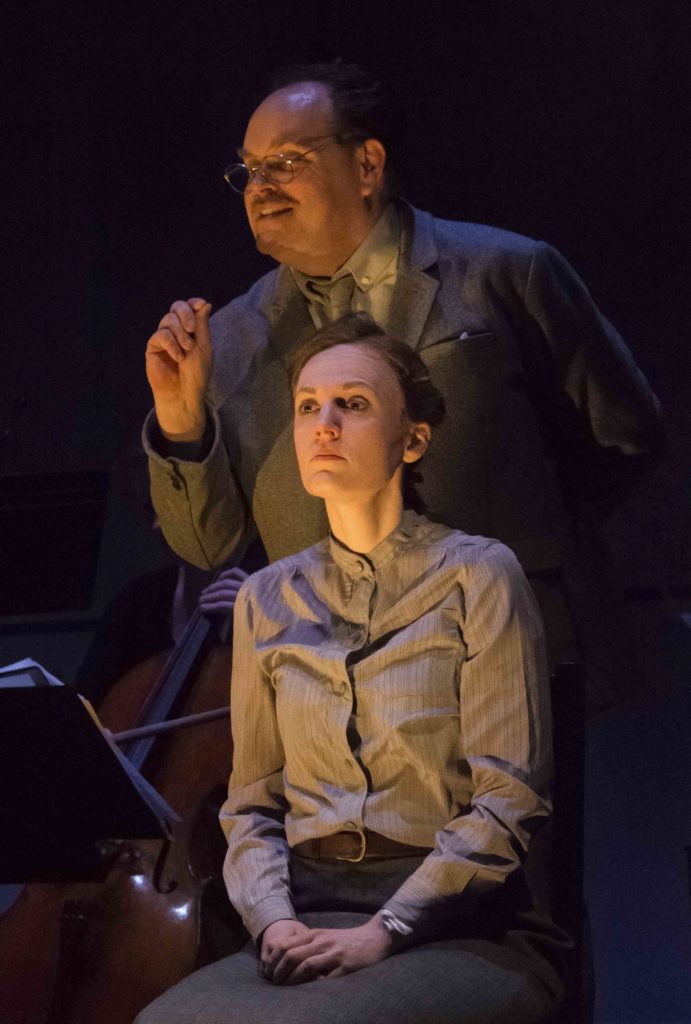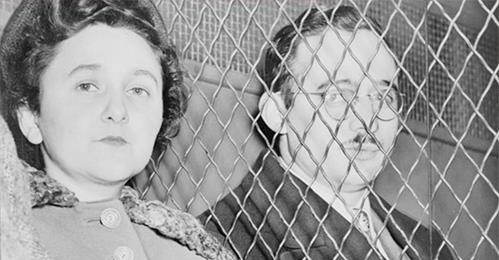
Church and Gibson; Kalman Zabarsky, Photographer
Presented by Boston Playwrights’ Theatre
Score by Joachim Holbek
Libretto by Rhea Leman
Music direction by Cristi Catt
Stage direction by Dmitry Troyanovsky
Dramaturgy by Magda Romanska
April 12 – 22, 2018
BPT
Boston, MA
BPT on Facebook
April 27-29, 2018
Brandeis University
Spingold Theater
415 South Street
Waltham, MA 02453
Review by Kitty Drexel
(Boston, MA) Ethel and Julius Rosenberg were accused of delivering crucial information on the creation of the atomic bomb to the USSR in 1953. This case, considered one of the most infamous spy cases in US history, validated HUAC and contributed to the country-wide paranoia known as the Red Scare. Such attacks on communist affiliates is similar to the current presidential administration’s attacks on socialism. The Rosenbergs (An Opera) considers the couple accused of treasonous espionage. It proves that the American government and the people it claims to serve have changed very little in the last 65 years.
The Rosenbergs were scapegoats. The beginning of the opera tells us that Ethel (Christie Lee Gibson) and Julius (Brian Church) were in love. They married. They had the same dreams that most of us have: to help people, to raise a family, to live a good life. Ethel and Julius became communists at a time when communism offered viable alternatives to the horrors of capitalism. In two acts, composer Holbek and librettist Leman teach us how HUAC bastardized the judicial process so to condemn Ethel and Julius to death. Senator McCarthy, Judge Kaufman and their cronies were more interested in power than in justice.

Ethel and Julius Rosenberg loved.
This opera attempts to discuss the Rosenbergs trial objectively*. Leman writes her libretto without casting much judgement on her characters. Aside from painting them as a loving couple betrayed by family and mistreated by a corrupt government, we are made decide whether the Rosenbergs were guilty. Historical accounts from the living and dead cast serious doubts on evidence and due process. Rather, Leman and Holbek ask us to instead focus on the Rosenberg’s humanity, and, in turn, to see the System’s lack of it.
Holbek’s scores is reminiscent of Kurt Weill’s American opera works. There are jazz elements, notably the inclusion of “Pennies From Heaven” (Johnston and Burke), and contemporary opera orchestration. Percussion is created with raps on the piano, cello and violin. Holbek’s score communicates succinctly all the dramatic information the audience needs to understand the Rosenbergs’ plight.
Performers Church and Gibson took approximately 25 minutes to warm to their audience. Their voices were warm but their bodies were stiff. Just as their characters fell in love, the vocalists eased into the performance. They became a symbiotic organism with the chamber ensemble. Gibson’s voice flourished as she sang the aria, “I Don’t Know Why I’m Here.” Church embodied the warm conviction Julius Rosenberg expresses in photographs. They are well matched and it is clear why they were cast to tell this story.
Scenic designer Cameron Anderson transformed BPT’s black box. Church and Gibson fictionally wade through factual sands of time and reason. Lighting designer Christopher Ostrom creates stark shadows across the set that dramatise the music as well as the action.
The people in power will do whatever they want to the people without it. Our American history proves this to us again and again. The Rosenbergs were found guilty by a rotten judge at a time when it was more convenient to condemn them than it was to question the actions of McCarthy’s HUAC. In the same vein, it is more convenient to ignore the idiot, orange fascist currently playing at President while his administration unravels civil liberties. In a better world, The Rosenbergs would be a myth intended to shock only. Today, it’s a reality.
*True objectivity does not exist.
